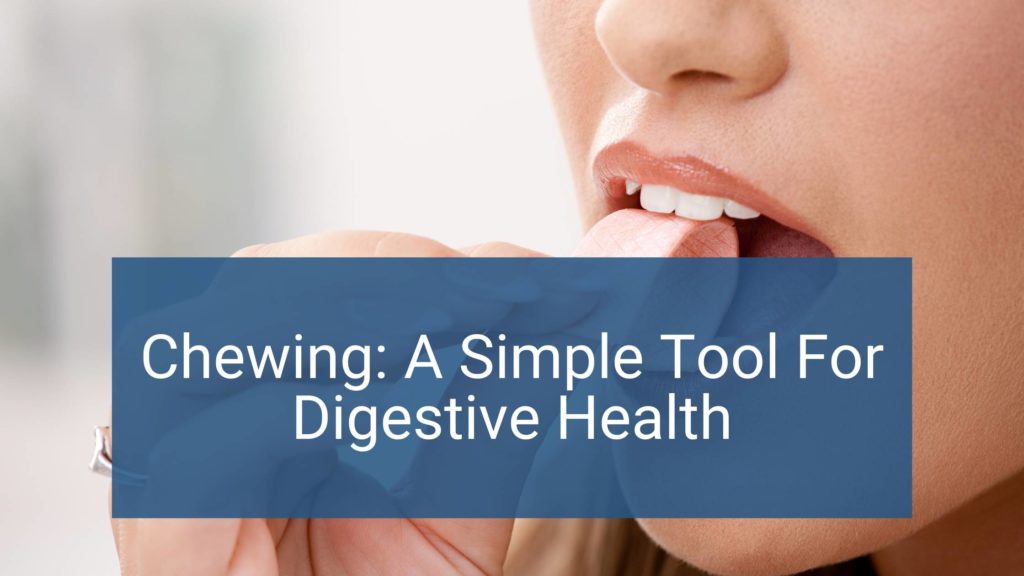Do you ever ask your clients this simple question…
”How well do you chew your food when you eat?”
Most people don’t think about chewing, and yet how well you chew your food plays a fundamental role on the effects of both daily and long-term health. It is one simple act that you and your clients can do to improve digestion, and something that can often be overlooked when diving into the complexities in one’s metabolism. Most people are unaware that digestion actually begins with the mouth, and that without adequate chewing, the body will be unable to properly digest food.

Why Chewing Is So Important
As Functional Health Coaches, it is imperative to educate clients on the healthy behaviors that can impact every cell, tissue, organ and system in the body. Although it may seem like a basic task, this sometimes starts with explaining something as simple as the importance of chewing food thoroughly.
When you take a bite of food and begin to chew, it breaks down large food particles into much smaller particles making the food easier for the digestive system to digest. The more you chew, the smaller the particles become, allowing for maximum absorption of vital nutrients. This allows you to get the greatest health benefits from the food you eat.
Chewing food more thoroughly can also help your client’s waistline. Chewing more slowly can be an effective way to reduce the amount of food that you consume because it allows the body’s signals to let you know that you are full. This response typically takes 20 minutes after you begin eating. If you are eating quickly and not fully chewing food, there isn’t enough time for the satiation response to occur and you ultimately will consume more food, which can lead to weight gain and cause further chronic illnesses.
Chewing stimulates the production of saliva which lubricates the food you eat. This is important, particularly when eating dry foods. Swallowing fully lubricated food reduces the stress on the esophagus and allows the food to pass through to the stomach much more easily.
The act of chewing also releases digestive enzymes into the saliva, which begin the breakdown of food before it even reaches the stomach. These enzymes are necessary to help break down food into vital nutrients that your body uses to function. The longer you chew, the more opportunity the enzymes have to breakdown food, reducing the digestive burden to the stomach and small intestine.

If you do not chew fully, large food particles are then allowed into the stomach. Often, these particles are not fully broken down in the stomach and are then allowed to enter the intestines. Once these large food particles reach the intestinal tract, bacteria begin to putrefy the particles, which can lead to bloating, gas, diarrhea, constipation and other digestive complaints. When you chew more fully, it reduces the risk of this problem.
When you fully chew food, it gives you the opportunity to truly taste and savor what you are eating. Eating should be pleasurable. But often, people eat so quickly not getting the opportunity to actually taste the food they are eating, leaving them feeling unsatisfied and yearning for more.
These incredible benefits about chewing and properly digesting that you should share with your clients when consulting on proper diet and lifestyle.
They may have no idea about the negative impacts that a quick daily work lunch is having on their overall metabolism and as a Health Coach it is not only your job to make them aware, but coach them on how to improve their habits.
As Functional Diagnostic Nutrition® Practitioners say, “we educate, not medicate.”

How To Educate Your Clients About Proper Chewing
The most common question you might receive from clients is “How long do I need to chew my food?”. Many people go through life unaware of how many times they should chew their food for greatest digestive benefit. Clients should aim to chew each bite at least 30 to 50 times, until the food has a liquid consistency.
Here Are Some Helpful Tips To Share With Clients:
- Remember to put down your utensils in between bites. This gives you time to chew each bite more fully, without loading up your fork with more food.
- Take smaller bites of your food. This will allow you to break each bite down more easily.
- Chew your food until it has a liquid consistency to it.
- Do not take another bite until you have fully chewed and swallowed the bite before. Many people put more food in their mouth before they have even swallowed what is already there.
- Wait to drink any liquids until after you have fully swallowed your food. This will prevent you from washing down food particles that are too big.
- Allow yourself to fully taste each bite. When is the last time you really took the time to be aware of the way your food tasted? Pay attention and you will start to notice subtle things about the taste of your food.
- Many people are distracted eaters. They watch TV, or look at their phones while eating. Focus on becoming a mindful eater and removing any distractions.
- Enjoy good conversation with others over a meal. We typically eat more slowly when talking with friends and family while eating.
- Take a nice walk to help digestion. A gentle walk after eating can help digestion and help blood sugar levels. It is best to avoid vigorous exercise at this time.
When your clients put these tips into practice and time goes on, this will create a natural shift in habit which will lead to better digestion and a positive shift in overall health.
Although proper chewing is a step in the right direction to optimal health, it is only one piece to a very large puzzle. There are many factors that can be at play affecting your client’s digestion or metabolism. With a Functional Diagnostic Nutrition® Certification you will have the training, tools and access to functional lab tests needed to help uncover hidden issues and resolve your client’s health complaints naturally.








